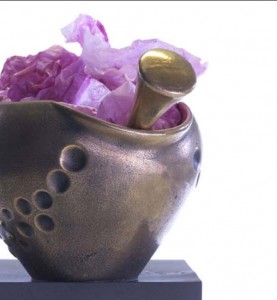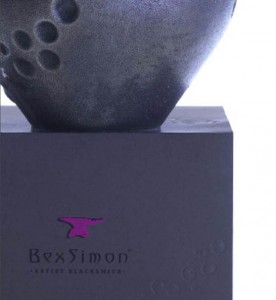It’s Friday and we’ve reached the end of a journey – the last in our series of reviews of the High Street Dreams, BBC ‘reality TV show’ about product branding, packaging & design development. Following on from yesterday, we continue to look at ‘Homeware’, but this time it’s the turn of Bex Simon, an artistic blacksmith who designs beautiful one-off metal-ware objects for the home.
From her forge in East London, she produces stunning one-off commissioned ‘works of art’ in steel. Everything from table-top candelabras to ornate garden gates. Like many other small businesses, she is limited by the achievable output from her ‘one-woman-band’ operation and to meet demand in a more ‘cut-throat’ commercial world would need to find reliable partners/outsourced resource who could produce her designs to the same quality but at a fraction of the cost.
Bex’s mentor in the show was product designer Nick Munro, who is famous for (at the age of 23) kick-staring his ‘business empire’ by turning a bedspring into a commercial success as an ‘egg cup’. He has since created ranges for John Lewis, Arga and Fired Earth, with over 500 designs in production. As a starting point he took Bex to the Victoria & Albert museum (V&A) to study 5 centuries-worth of ironmongery as inspiration. Was she inspired? You bet! Everything from cotton-twist glass, pan hangers, bells, door chimes and (the crowning glory) a pestle & mortar, which got Bex really excited!
So off she went to design her own and a week later, after mapping out all of her ideas on a giant floor-mural, came ‘back to the table’ with a wonderful pestle & mortar of her own. She contacted a commercial casting foundry regarding a mould and after commissioning a prototype, she sat down with the Jo Malone, Nick Leslau and Nick Munro to be quizzed about costings and, like many of the other creative ‘contestants’, failed miserably when it came to business and finance. Bex’s solution was to involve her husband Dave more in the business to cover the financial aspects, leaving her to cover the artistic elements.
At this point branding consultancy Landor were brought into ‘the frame’, providers of branding to well known brands like Heinz Baked Beans, Morrison’s supermarkets and Vodafone, to name but a few. The result was some very alluring branding in the form of an eye-catching and distinctive bright pink anvil logo (great) and a very appropriate grey/slate carton embossed with some swirling bubbles, the logo and a short sentence on the back of the carton, also in bright pink lettering (tastefully done): “FORGED with LOVEâ€. Bex says of the logo, it was a “cleverly designed pink colour infill to be off centre to represent the jarring from the strike of the hammer†The box was lined with some matching bright pink tissue paper which added vibrancy & energy to the pestle and mortar product within. See the picture above. Of all of the High Street Dreams packaging shown over the past few weeks, this is my favourite. Bex says herself, on her website: â€the colours we chose for the packaging and website were to represent the filth and grime of the workshop, whilst maintaining a luxurious and premium feel.†Having looked at Bex’s website (link at end of this post), I think that the branding there is also well put together and professional looking – overall it’s all very well coordinated.
Along with Harry Singer (see yesterday’s Phlib post), the ‘big test’ for Bex was a 1-day test that Jo Malone sorted out at the national lifestyle exhibition – The Ideal Home Show at Earl’s Court in London. The three things that they were trying to evaluate were:
1.   How you sell your product
2.   Whether you are great PR ambassadors to your product
3.   How the consumers view your product
Unfortunately for Bex, unlike Harry, consumers weren’t as engaged for her, with products priced at £125 for a pewter? (or maybe steel) pestle and mortar and £250 for a bronze version. Everyone liked her work but no one was willing to pay that sort of money for a piece of ‘kitchen decorative art/furniture’, even though it was all “hand finished and polishedâ€. This led to a concern by Jo and Nick that Bex wasn’t ready to pitch to a retailer – they thought that she needed more time to get her ‘act together’, which Bex took pretty well really. So she lived to ‘fight another day’. It’s interesting to note that, since the programme Bex announced on Twitter recently that she had been approached by Heals with a view to displaying some of her work in-store. So that’s a positive conclusion – well done Bex!
In terms of packaging, where does that leave us?
As far as I can tell, at the moment the only products that Bex is selling as ‘retail items’ are the pestle & mortar, which are available on her website for a price of £80 now – a big reduction on what they were being sold for at the Ideal Home Show exhibition. Other products, such as her wrought iron gates and garden furniture etc are generally huge and bulky, one-off items. These are impractical to develop or even have a need for a range of bespoke packaging but I think that Bex should make the most of her branding and maybe make some wrought-iron ‘tags’ on which she could etch “FORGED with Love from Bex†with her logo (each painted pink) as a really engaging and personal note to each customer – and that would be really novel!
Informing
I believe that there is also a place for Bex to print some really high quality brochures (if she hasn’t done so already), with some stunning atmospheric photography to engage consumers at an emotional level, providing an opportunity for Bex to ‘connect’ with her target market. She could provide all sorts of information on the brand heritage, her vision for the business, brand values, the methods she uses to make her artistic creations, the quality of materials & methods used and really build an emotional story on which to ‘pivot’ her brand.
Transporting & Protecting
Clearly there is a need to transport and protect the large items as they are transported, which is probably best performed by some form of ‘designer (pink?) bubble-wrap’ or other, more environmentally friendly material. Careful use of traditional ‘padding’ materials like corrugated board and bubble-wrap can provide a simple enough ‘filler’ to protect the product from crushing, but there are a number of alternative organic, compostable and ‘sealed air’ filler materials around now that can also provide a more ‘environmentally friendly’ transit packaging solution. These could be complimented with the embossed ‘anvil’ metal labels that I mentioned above to provide some branding.
I hope that this has highlighted SOME of the added branding and packaging considerations that need to be taken into account when developing and selling high quality bespoke art products to the market. Well done Bex, we wish you every success in the future.
You can find out more about Bex’s products from her Bexsimon website.
Chris Penfold


howard says:
Luke says: